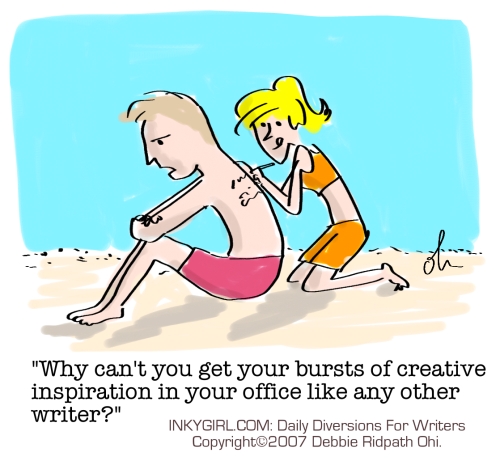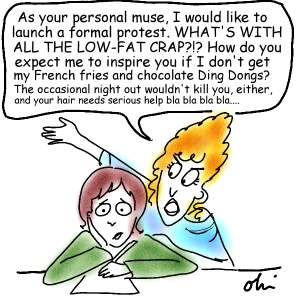
Wednesday, November 20, 2013
Up For The Challenge
Wednesday, July 3, 2013
Luck, Lightning Rods and the Publishing Industry: Tips On How To Make Your Own Luck - by Debbie Ridpath Ohi
I have mixed feelings about the word "luck" when it comes to publishing success because sometimes it's used in a context that doesn't give the writer enough credit for his or her own efforts or work.
At an SCBWI conference earlier this year, I overheard someone commenting to a friend of mine about how lucky she was in her publishing success. No reference to how hard she had worked or how much they enjoyed the book, etc. Just how very LUCKY my friend was.
Hm.
I've also been on the receiving end of the "you're SO lucky" comment several times as well, so can sympathize. In case you're not familiar with my publication story, here's what happened in 2010.
Yet part of me can understand the other person's point of view as well, having had experienced many (many) years of collecting rejection letters myself, in both print and digital format. I still so strongly remember how frustrating and depressing it could get, working hard to improving my craft and seeing increasingly encouraging comments from editors, yet never getting a book contract offer.
"Just write," common writing advice told me. "Don't give up!" Easy for YOU to say, I remember thinking. You're already published.
Here's what I've learned:
Luck does play a factor, but you can help make your own luck.
My friend Maureen McGowan (author of The Dust Chronicles) compares this kind of luck to building lightning rods. You can't control when the lightning will strike but you CAN build better lightning rods.
So my advice is to stop angsting about what you can't control and do what you can to make your own luck. Build better lightning rods.
 |
| Don't go overboard while building that lightning rod! |
Some suggestions on how to build a better lightning rod:
1. Meet others in the industry. I can't emphasize this enough. Networking online is great, but nothing can replace face-to-face interaction. If I could send a message back to myself before lightning struck, I would have told myself, "Start attending SCBWI conferences." I mention the SCBWI because that's how everything got started in my case. There are many other excellent conferences and events that might better suit your budget, geography and goals. In Canada, check out Packaging Your Imagination in Toronto; registration for this year's conference has just opened.
Registration will also soon be open for the SCBWI Canada East convention in Montreal (Oct.4-6, 2013); I'm going to be on the faculty along with Bonnie Bader (Penguin), Jill Santopolo (Philomel), Linda Pratt (Wernick and Pratt Agency), Laurent Linn (my art director at Simon & Schuster Books For Young Readers!!) and David Diaz (Caldecott-winning illustrator and SCBWI Illustration Mentor rock star :-)).
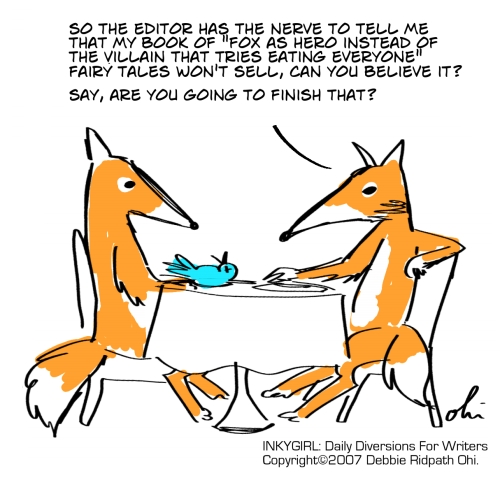
2. And when I say "others in the industry," I don't just mean agents and editors. Meet other writers, both published and unpublished. You can learn from all of them. What helped me: commiserating with others who were in the same situation, for mutual encouragement as well as helping to put things in context. This improved my overall attitude, which I'm sure showed in my public posts. I also became better acquainted with some of these contacts over the years we have helped each other from time to time, including sharing of info and helping promote new books.
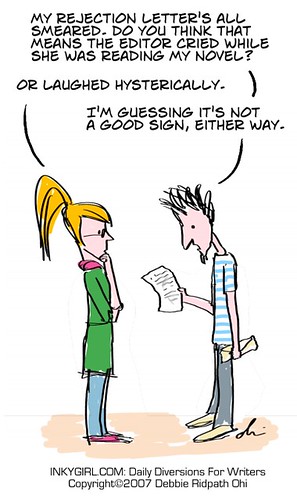
3. Establish an engaging, active presence online. Learn how to improve your website and/or blog. Learn how to use social media. I have heard many agents and editors say that before they sign a client or offer a contract, they do research online to see what kind of online presence the author may have, what kind of person they are, etc.
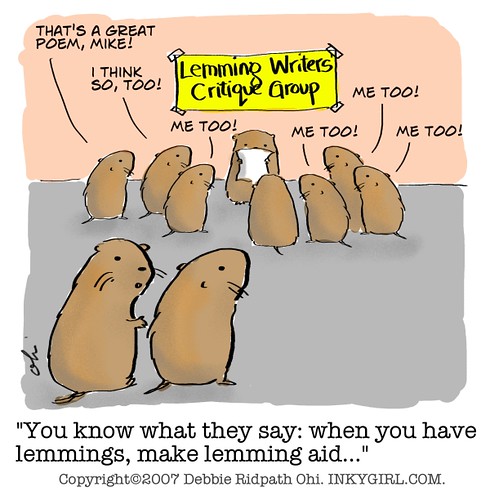
BUT REMEMBER:
All the above advice assumes that you already have a good mss with market potential. If your writing sucks or your story idea is lame/overdone, having the biggest and most technologically advanced lightning rod won't help. So...
4. Keep working on improving your craft. Write every day. Work on getting better. Find a good critique group like MiGWriters.
Do you agree or disagree? Any other advice to suggest for writers? Please do post it below.
-------------------
Debbie Ridpath Ohi writes and illustrates for young people. For a list of her current and upcoming books with Simon & Schuster, HarperCollins and Random House, see her Books list. She blogs about kidlit/YA at Inkygirl.com and tweets from @inkyelbows.
Wednesday, January 23, 2013
Monday, August 6, 2012
Finis Cornonat Opus
Friday, May 18, 2012
The Drive to Write
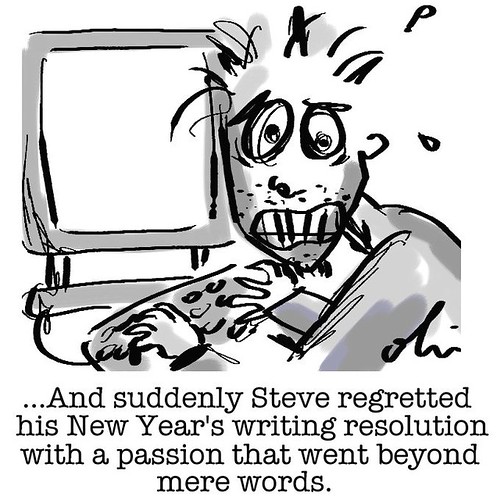 As I struggle to get further ahead in the writing and publishing
process (I’m in the “find an agent” phase), there’s always a new hurdle to
face. Most of them seem to be about what I need to learn to get where I want to
be.
As I struggle to get further ahead in the writing and publishing
process (I’m in the “find an agent” phase), there’s always a new hurdle to
face. Most of them seem to be about what I need to learn to get where I want to
be. A lot of my learning is through revising my novels, and sometimes I get to a point where I feel like I just can’t put any more hours into a project. Especially when it seems that there’s still so much more revision work to be done. The questions I’m trying to address are huge, because they usually involve rethinking the whole novel:
The feeling of not getting anywhere can be overwhelming. This week I really appreciated Shannon Messenger’s honest vlog about how, even after she got her agent, she considered quitting: Shannon Messenger Takes the Truth
I've considered quitting more than once this year, but I always end up persevering. Why? Part of it is because of the people cheering me on – my writing buddies and my family. Part of it comes from those small signs that I’m making progress – requested revisions, feedback from my crit group or beta readers. But ultimately, it comes down to me. If I didn’t have the drive to continue, the outside support wouldn’t be enough.
Writing is so embedded in my life that I don’t think I could stop. I also really hate to give up on anything. I even have visions of going back to those drawer novels one day and fixing them up. I always feel like I know I can do it, and this latest revision might be the one that helps me move closer towards my goal.
Sunday, May 13, 2012
Some YA Highway love
HERE
I'm always on the lookout for awesome blogs to help me procrast... um, inspire me. What blogs do you read?
Friday, April 6, 2012
The Lifelong Influence of Good Children's Books
I think reading Beatrix Potter’s books and learning about her and her life planted the seed of my writing dream. Growing up, I was interested in drawing plants and tiny creatures from nature. And I made up stories about families of mice. The first novel I wrote was about tiny human-like people that live in a garden. It’s so interesting to see how the spirit and love of those tiny tales connects to so many different parts of my life and has influenced me as a writer.
-- Andrea
Thursday, November 3, 2011
Thursday, September 22, 2011
Comic: Personal Muse
From the Inkygirl archives.
As I posted this comic, I realized that this actually ties in with Andrea's post last Friday. I know some people will disagree, but I think that everything we read influences us as writers. Maybe not directly (e.g. reading a Stephen King novel isn't necessarily going to make me write like Stephen King), but it does go into the melting pot that is my creative muse.
I read a wide range of books, from popcorn-type beach reads to nonfiction and literary, but I tend to mostly read books written for young people. Not just because that's what I write but (as Andrea says) because I enjoy them. When I'm writing a novel, though, I try not to read too many books by the same author in a row because I'm worried that that author's style will influence my own a little too much.
Friday, April 1, 2011
Looking Back for Inspiration
Wow! That's hardly any time compared to my first novel. It took five years before I reached the feeling that I'd completed it, or didn't know what else to do. I must be learning something.
Sometimes it can be encouraging to step back and look at the bigger picture. I often get caught up in the day-to-day details of writing, which have so many ups and downs. Sometimes a lot of downs. But a little over a year seems pretty reasonable for writing and revising a novel. Now I'm inspired to get my revisions finished!
Here are my goals for April:
1. Finish revisions on Novel #4.
2. Polish Novel #4. The feedback I'm getting from critique buddies suggests it might be ready to start subbing soon.
3. Write a query, pitch sentence and synopsis for Novel #4.
4. Oh yeah. And definitely decide on which title I'm going to use.
How is your writing project coming along? Have you ever found inspiration from looking back at what you've accomplished? What goals do you have for the coming month?
Friday, February 11, 2011
Investing in Your Writing
1. Making the time. Can you truly call yourself a writer if you don’t spend much time writing? It’s hard, but setting aside that time is about you telling yourself your writing is important. Slug through the hard parts and finish your project. Set aside some time to actually write.
2. Learning about the craft. They say you can improve your writing just by doing it. (Isn’t that cool? But see point #1.) Even more improvement can come by reading the work of other writers to see how they do things. And by finding out your weak points and learning more about them (now you know why I’ve been visiting The Plot Whisperer).
3. Going to Conferences. Okay, they are expensive and not for everyone (I haven’t been to one yet). It’s hard to ignore the benefits though. So much happens there that can’t be captured in a buddy’s blog post... all the great, inspiring stuff. And I keep hearing about people that get great agent and editor contacts, too.
4. Sending out queries. I have to admit I haven’t been so great about doing this. I’ll send out a few, then get some rejections. So I assume something is wrong with my novel and set it aside (because by then I’m already working on another one). Those queries aren’t always just about trying to get published. They are about you saying you are taking steps to reach your goal. No one will ever see your book if you don’t let them know it exists, right?
Investing in your writing is a way to say you believe in yourself.
How do you invest in your writing?




